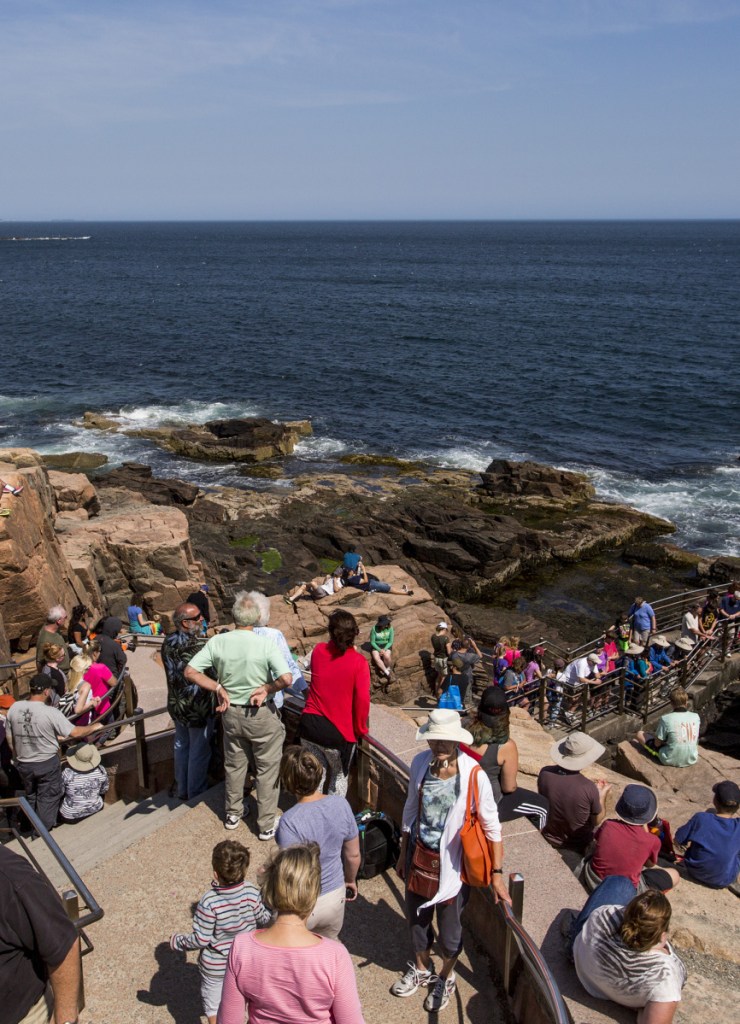BAR HARBOR — Acadia National Park recently released a set of proposals on how to preserve park resources and ensure public enjoyment in the face of rapidly growing visitation. With Acadia visits up nearly 60 percent over the last decade (3.5 million last year alone), many fear that the current approach is not sustainable.
Many of the concepts in the recently released transportation plan have been shaped by public input over the last two years. Some of the key elements include:
* Expanding the Island Explorer bus service, which has proven immensely successful and has carried over 7 million riders since its launch 18 years ago.
* Expanding park-and-ride lots at the Visitor Center in Hulls Cove and the Acadia Gateway Center property in Trenton.
* Restricting oversized vehicles from narrow and winding park motor roads.
* Reducing roadside parking, which can often pose a safety risk on busy routes.
* Introducing the concept of reservations for private vehicles to access some of the busiest sites – like Cadillac Mountain, Ocean Drive and Jordan Pond – during peak visitation times.
DOING NOTHING NOT AN OPTION
We’ve already heard from some neighbors who feel that the proposals contained in the park’s preferred alternative go too far. We have also heard from others who feel that they don’t go far enough. In the park’s search for middle ground, there seems to be one thing nearly everyone agrees on – doing nothing is not an option.
For those of us lucky enough to live next door to the park, and who are accustomed to accessing Acadia whenever the mood strikes, the notion of having to make a parking reservation and pay a few bucks for the privilege requires a new mindset. It is natural to mourn the potential loss of spontaneity and the increased management of “our” park as proposals are phased in over the next several years.
In fact, a vast majority of trailheads, carriage roads, lakes, ponds and shoreline will still be accessible without any reservation. Many of us have already adjusted our use patterns to avoid the busiest sites at peak times.
It undoubtedly would be less stressful, for those special times when we do want to take a scenic drive, perhaps to show an out-of-town guest Acadia’s “greatest hits,” to have the certainty of a reservation, knowing that even on Ocean Drive at midday in August there would be room to park and no worries about dealing with gridlock.
Those who do not wish to pay, or who cannot get a reservation, could still hop on one of the fare-free, low-emissions Island Explorer buses. Hiring a taxi or taking a commercial tour would be other options.
Bicyclists have been largely displaced from sites like Ocean Drive and the Cadillac Summit Road at peak times due to unsafe traffic conditions. Many of the proposed approaches would, over time, make the park more bicycle-friendly, further reducing vehicular congestion and air pollution.
VISITORS OF THE FUTURE
The livelihoods of thousands of Mainers depend in whole or in part on Acadia continuing to offer a stellar experience to those millions of annual visitors. While some business owners may at first be concerned about change, the effort to better manage visitation and ensure a smoother flow of traffic and a higher-quality visitor experience should over the long haul ensure a more stable and predictable business environment. Acadia generated about $284 million in economic activity in surrounding communities last year. Many, many Mainers benefit from this rising tide.
There is no single story-line for how and why we love Acadia National Park. The park has many different constituencies – and they seem to be ever-expanding, as people find new ways to experience their park. The National Park Service faces a very tall order of satisfying these diverse and sometimes diverging audiences and users, particularly in a place as complex as Acadia – with its dozens of different entrance points, its small size and high visitation.
Given the deeply personal relationship many of us feel with Acadia, the conversations during the public comment period over the next couple of months will be lively – and important.
Along with contemplating how the proposed changes may affect us today, it is also important to keep the visitor of the future in mind. I encourage everyone who loves Acadia to review and comment on the plan before June 26. I also urge you to think out five, 10, 50 years – or beyond. Each of us can play a role now in ensuring that what is special about Acadia will be protected for future generations.
Copy the Story LinkSend questions/comments to the editors.



Success. Please wait for the page to reload. If the page does not reload within 5 seconds, please refresh the page.
Enter your email and password to access comments.
Hi, to comment on stories you must . This profile is in addition to your subscription and website login.
Already have a commenting profile? .
Invalid username/password.
Please check your email to confirm and complete your registration.
Only subscribers are eligible to post comments. Please subscribe or login first for digital access. Here’s why.
Use the form below to reset your password. When you've submitted your account email, we will send an email with a reset code.